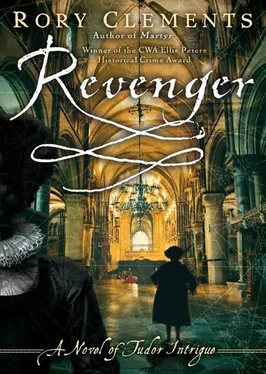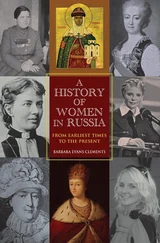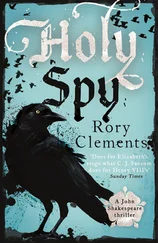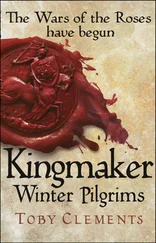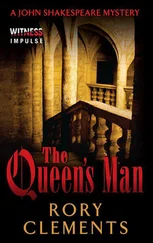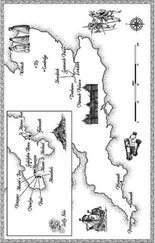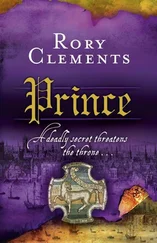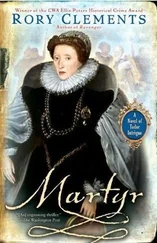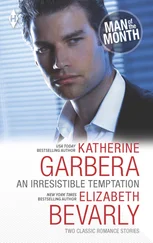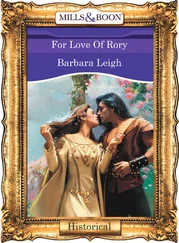Shakespeare wanted to follow her, but it was pointless. This storm, if it was to pass, would not be calmed by harsh words. He still felt angry. He had been right all along. A trap had been set for Southwell, and Catherine had almost walked into it. But who was behind it? A suspicion was clawing at the back of his mind, scratching like a terrier’s paws at the earth. The name McGunn would not go away.
He looked at the squat figure of his man, Boltfoot Cooper, as if he might find some solution to his problems there. But Boltfoot had his own concerns: Jane, his wife, was heavy with child, and they had already lost their firstborn at birth.
Boltfoot did not smile. His rugged face was weather-beaten into permanent lines and creases, set hard like the furrows on oak bark, the reward of many years at sea.
“I am going for some air, Boltfoot. Remember, spend time with Jane. One disconsolate wife in a household is more than enough.”
Outside, he walked by the river. A light breeze brought some relief from the sun, now high in a cloudless sky. He looked east toward the bridge and watched the cormorants fishing.
A man appeared at his elbow. “At least the waterbirds keep cool, do they not, sir?”
Shakespeare turned toward the voice. It came from a man of advanced years, perhaps fifty, with a generous face beneath a thinning pate of white hair. Shakespeare knew him, but could not place him. He wore a poor shirt and breeches beneath a farmworker’s felt hat. Shakespeare smiled at him. “Forgive me, I do not recall your name.”
“Clarkson, Mr. Shakespeare. I was Lord Burghley’s man for many years.”
“Yes, of course. I am sorry, Clarkson. Are you pensioned now?”
“Not exactly, sir. Let me speak plain, though quietly, if I may. This meeting is not an accident. I am here to talk with you, privately.”
Shakespeare frowned. “You wish to talk with me? Why not come to my house?”
“The same reason that I am not in my livery, sir. I must not be seen with you. This is a matter of some delicacy and it is not possible to know who might be watching.”
“You had better tell me more.”
“Indeed, sir. Perhaps if I were to walk off eastward and you were to turn back alone up Dowgate, taking care to see if anyone dogs your footsteps, then we could meet again out of the public glare. Might we say the church of St. John in Walbrook in five or ten minutes’ time, sir? It will be cool in there and we can talk without being observed or overheard.”
“Clarkson, you have me intrigued. I will see you there.”
Shakespeare liked Clarkson and believed him trustworthy. As he walked slowly along Dowgate north toward Walbrook, he looked about him to see if he was followed. The streets were thronged with noisy crowds and clogged with wagons and carts that could scarce move for the poor parking of other wagons and the scaffolding on houses in the narrow lane. It would be difficult to discern the prying eyes of a stranger among this sweating mass of humanity.
St. John’s in Walbrook was empty when he entered. But as Clarkson had predicted, it was pleasantly cool, a sanctuary on this baking-hot day. The church was sparsely furnished, with only a few three-legged stools to sit on and a table where once a great Catholic altar had stood. All the finery of Rome had been torn out and burned; the rood-screen and the confession boxes, the bones of saints and painted paneling, all long gone in a great bonfire. The stained glass had been smashed years ago by Protestants and not replaced.
Shakespeare sat on one of the stools and waited. When he had been there a minute or two and no one else had come in, he heard a noise, like a whispered call, from a small chapel to the side and went to investigate. There was a door to the vestry. He went in and found Clarkson there.
“I am sorry for the secrecy, sir,” he said. “But as you will discover, it is entirely necessary. I hope that neither of us has been pursued here.”
“I am afraid I have no way of knowing, Clarkson. Now, pray, tell me what this is about.”
Clarkson looked grave. “I am now in the employ of Lord Burghley’s son, Mr. Shakespeare. I am sure you know of him: Sir Robert Cecil, a Privy Councillor and already taking on much of the workload of the late Sir Francis Walsingham. Some say he is already Principal Secretary in all but name.”
Cecil? Of course Shakespeare knew of him. He was probably the most influential of the younger men in Elizabeth’s government, even if he lacked the raw physical power and dash of courtiers such as Essex and Ralegh. “And what has that to do with me, Clarkson?”
“He wishes to see you, sir. On a matter of great import to the realm, I believe, though I am not in a position to tell you what it is.”
“And when and where am I to see him?”
“He is at Theobalds, sir, his country home in the county of Hertford. He asks that you come straightway to him and he apologizes for the inconvenience to you.”
Shakespeare shook his head. First Essex, now Cecil. But he had no choice. When such men summoned you, you obeyed the call. “May I return to the school first, to reorganize my lessons?”
Clarkson shook his head. “I fear that would be too hazardous. Just follow me now. I have horses waiting.”

I N A REMOTE HOUSE on that bleak and lawless tongue of swampland known as the Isle of Dogs-though it was no island, being surrounded on just three of its sides by the Thames-a frightened man sat, stripped to the waist, on a high-backed wooden chair. His wrists were strapped to the chair arms and he clenched his hands in fists. His upper arms and shoulders were bound tight to the back struts. He was a strong, muscular man but he could not move. He shivered uncontrollably, though the day was sweltering. Sweat poured from his thinning black-gray hair and forehead into his eyes, and piss trickled down from his breeches to a puddle on the floor.
Slyguff stood in front of him, holding a pair of tanner’s shears-powerful iron clippers that cut through leather with ease. The man on the chair shrank into himself, terror in his wide brown eyes. He was about thirty, with the honed body of a mariner. Slyguff prized apart the clenched fingers of the man’s left hand. With practiced art, he pushed the blades of the shears over the soft, sinewy web of flesh between the thumb and forefinger. With his one working eye, he looked into the man’s eyes for some sign of cooperation, then snipped.
The blades sliced through the flesh, splitting the two digits yet further apart. The man screamed. He would not be heard, for no honest beings came near this desolate place on the marshes, save wading birds and the feral dogs that roamed here free. Blood shot out from the man’s cut hand onto Slyguff’s apron and face. He wiped it with the sleeve of his shirt, then moved the shears to the next arc of webbing between the forefinger and the middle finger.
“Mr. Slyguff, please, I beg you in God’s name. I do not know where Bramer is. I have not seen him these five years.”
Snip. A deep groan of pain and terror. It was an unnatural noise, a roar of despair. Slyguff pulled back the clippers and looked into the man’s eyes again. Still he did not see what he wanted. He moved the shears back to the bloody morass of gore that was the man’s left hand, on to the next arc of webbing, the flesh between the third and fourth finger. The cry of seabirds and the distant barking of dogs and the man’s fevered breathing were all he could hear as he carried on with his morning’s work.
In the corner of the room, a man looked on impassively, his hand on the hilt of his glittering sword of finely honed Spanish steel.
Читать дальше
